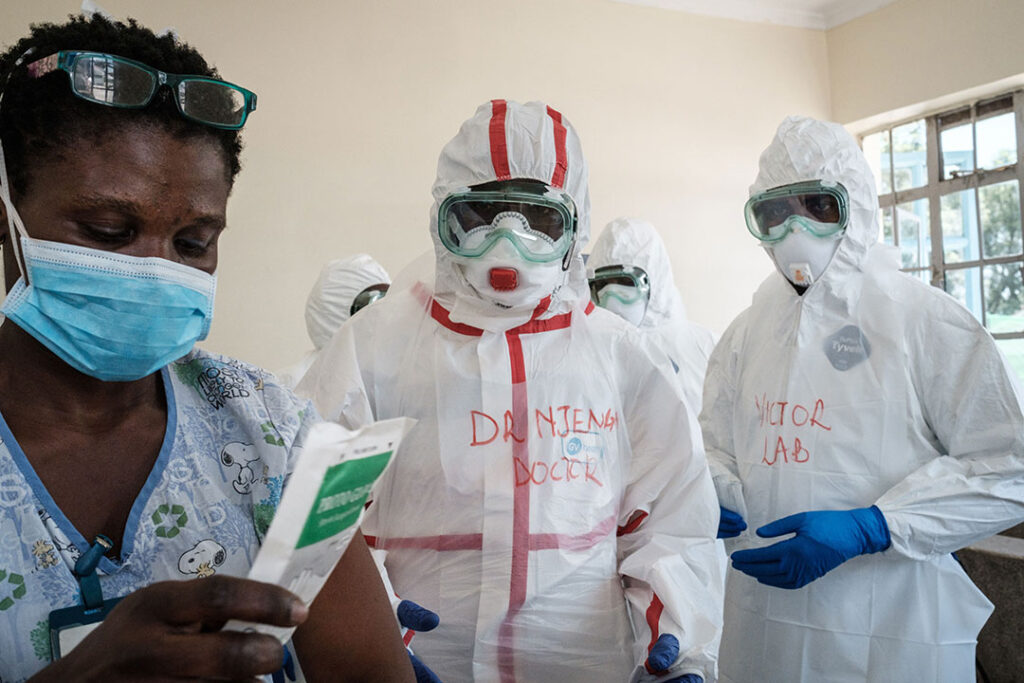ADF STAFF
As COVID-19 continues to spread throughout Africa, national health authorities may need to impose quarantines and containment measures to isolate people who have been in contact with those infected. The World Health Organization (WHO) has devised a list of guidelines for COVID-19 quarantines.
A summary of these measures is below. The full guidance can be found at this website: https://www.who.int/publications-detail/considerations-for-quarantine-of-individuals-in-the-context-of-containment-for-coronavirus-disease-(covid-19)
A quarantine involves restricting the movements of healthy people who may have been exposed to the virus or separating them from the rest of the population so authorities can monitor their symptoms and detect illness early. Quarantines must be part of a comprehensive public health response and must fully respect the “dignity, human rights and fundamental freedoms of persons,” WHO states.
Isolation is when ill or infected people are separated from others to prevent the spread of infection or contamination.
Before a quarantine, countries must effectively communicate their intentions to reduce panic and ensure compliance. This can be done by:
- Providing clear, up-to-date, transparent and consistent information.
- Engaging with communities to assure acceptance.
- Providing those quarantined with health care; financial, social and psychosocial support; and basic needs, such as food, water and other essentials. Vulnerable populations should be prioritized.
- Assessing cultural, economic and geographic factors to plan for appropriate quarantine measures.
Quarantines should be enacted early, but carefully, during an outbreak. Anyone who has been in contact with a lab-confirmed case of COVID-19 should be quarantined for 14 days from the last exposure. A contact is anyone who has been involved with any of the following from two days before and up to 14 days after the patient exhibited symptoms:
- Having face-to-face contact with a COVID-19 patient within 1 meter and for more than 15 minutes.
- Providing direct care for people with COVID-19 without proper personal protective
- equipment.
- Staying in a close environment with a COVID-19 patient (a workplace, classroom or household or being at the same gathering) for any amount of time.
- Traveling within 1 meter of a COVID-19 patient in any conveyance.
- Other situations, as indicated by local risk assessments.
PROPER SETTINGS AND ACCOMMODATIONS FOR QUARANTINES
- Those quarantined must be in ventilated single rooms with adequate space and sink and toilet facilities when possible. (If single rooms are not available, beds should be at least a meter apart.)
- Use environmental infection controls, such as adequate air ventilation, air filtration and waste-management practices.
- Maintain a social distance of at least a meter between all quarantined people.
- Accommodations must include comfort, food, water and hygiene facilities; protection for baggage and other possessions; medical treatment for other existing conditions; communication in a language those quarantined can understand; an explanation of the person’s rights, available services, how long they will need to stay and what will happen if they get sick; and contact information for embassy or consular support.
- Provide medical assistance for quarantined travelers who are isolated or subject to medical examinations or other procedures for public health purposes.
- Allow quarantined people to communicate with family members outside.
- Provide access to the internet, news and entertainment if possible.
- Make psychosocial support available.
- Older people and those with other health conditions require special attention because of their increased risk for severe COVID-19.
Quarantines can be held in homes, hotels or dormitories if the locations are safe and suitable. When at home, the person should stay in a well-ventilated single room. If a single room is not available, stay at least a meter away from other household members, minimize the use of shared spaces and cutlery, and make sure that shared spaces are well-ventilated.
Everyone in quarantine, and those attending to them, must practice proper hand and respiratory hygiene, such as frequent and thorough hand-washing and covering coughs and sneezes.
Finally, quarantine areas should be cleaned and disinfected daily to include surfaces and bathrooms, and linens should be changed and cleaned regularly. Cleaning personnel should wear disposable gloves.
Those in quarantine should be checked for symptoms and body temperature daily. Respiratory samples should be tested in a lab at the end of the quarantine.
WHO will monitor COVID-19 and update this guidance as necessary. Otherwise, this guidance will expire two years after its publication date of March 19, 2020.

